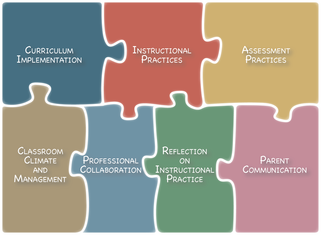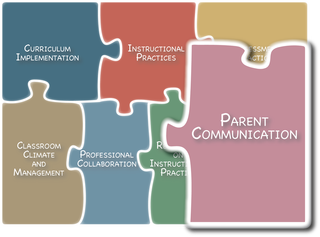At the heart of the confusion is the mixing of terms. The primary issue is that there is a difference between the word “teacher” and the word “teaching.” Teacher is a noun. Teaching is a verb. Teaching (v) is just one part of being a teacher (n). Charlotte Danielson makes sure that followers of her model clearly understand this difference: “The framework for professional practice represents all aspects of a teacher’s responsibilities that are reflected in daily work.” She goes on, “The framework is comprehensive, referring not only to what occurs in the classroom, of course, but also to what happens outside the walls (p.14, Enhancing Professional Practice, 1996).” The things that happen outside the classroom walls are not necessarily teaching, although they are still part of what makes up a good teacher. SB 6696 is concerned with evaluating the teacher, not just the teaching.
It's easy to see why the attendees might have been confused and even frustrated. They thought they were attending a Yoga class, but instead found out there was a lot more to it. Calling the comprehensive exercise program “Yoga” was inaccurate. A more accurate title might have been something like “Comprehensive Exercise Program” and Yoga could have been listed as just a part.
Similarly, the language used in the development and implementation of SB 6696 has caused confusion among educators. We would like to offer a suggestion for clarification. The frameworks being piloted for the Teacher Evaluation System should, in our opinion, be called Professional Practices Frameworks, rather than Instructional Frameworks, because they are dealing with more than just instruction. Each one contains instruction, just like a comprehensive exercise program might contain Yoga, but is not limited to instruction. For this reason, calling them Instructional Frameworks is not accurate whereas calling them Professional Practices Frameworks would be accurate, since it is a broad name that encompasses all aspects of a teacher's duties (see Figure 1). For example, Parent Communication is an important part of being a good teacher, but it is not instruction (see Figure 2). This is true of many of the things that make up a good teacher.
There are three main problems with giving what are actually Professional Practices Frameworks the title of Instructional Frameworks:
- They are not Instructional Frameworks; they are bigger than that;
- Districts need to have an actual Instructional Framework but might not develop one if they think they already have it; and
- Educators may not understand the differences between their Professional Practices Framework and their Instructional Framework, let alone the Instructional Models used in the district, and the Instructional Strategies that are being focused on in the district (We will discuss the differences among these four terms in an upcoming post).



